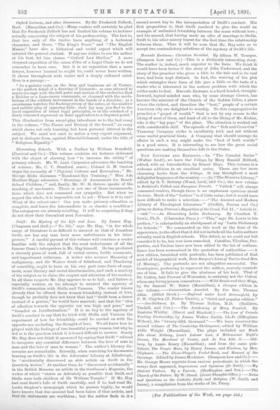Oxford Lectwres, and other Discourses. By Sir Frederick Pollock, Bart.
(Macmillan and Co.)—Many readers will certainly be glad that Sir Frederick Pollock has not limited his volume to lectures actually concerning the subject of his professorship. The fact is, that two only of the twelve have anything of a technical character, and these, "The King's Peace" and "The English Manor," have also a historical and social aspect which will interest the general student. If any one wishes to see the author at his best, let him choose " Oxford Law Studies." A more eloquent exposition of the raison d'ttre of a Legal Chair we do not remember to have seen. But it is an exposition that a mere lawyer, however learned he might be, could never have written. It shows throughout wide tastes and a deeply cultured mind.
Here is a passage :— " As a painter rests on the deep and luminous air of Turner, or the perfect detail of a drawing of Lionardo ; as ears attuned to music are rapt with the full pulse and motion of the orchestra that a Richter or a Lamoureux commands, or charmed with the modu- lations of the solitary instrument in the hands of a Joachan ; as a swordsman watches the flashing swoop of the sabre, or the nimbler and subtler play of opposing foils : such joy may you find in the lucid exposition of broad legal principles, or in the conduct of a finely reasoned argument on their application to a disputed point."
This illustration from sword-play introduces us to the last essay in the volume, "The Forms and History of the Sword," an essay which shows not only learning, but keen personal interest in the subject. We must not omit to notice a very cogent argument, put in dialogue form, against Disestablishment, under the title of " Religions Equality."


































 Previous page
Previous page